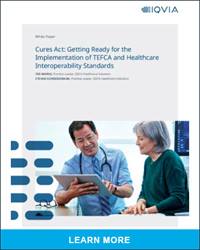















- Locations
- United States
- US Blogs
- Healthcare Information Interoperability Cannot Come Fast Enough
The COVID-19 pandemic is substantiating the need for improved interoperability of healthcare information in the industry. The realities of managing this disease has proven that the availability of timely and accurate information is key to driving both informed, efficient public health decisions and individual patient care decisions, especially in times of crisis.
 Accurate and timely availability of healthcare information is not only needed to get an all-inclusive view of a patient’s health and care history, but it is also needed for data-driven decision-making by public health officials, health system administrators, and payers. Unfortunately, healthcare information exchange and the interoperability of health data has long been a challenge in our industry. From a lack of standard definitions to barriers that prevent reliable, consistent, and secure data exchange (either because of technology gaps or privacy issues), the challenges have consistently obstructed progress. There has also been an absence of urgency; too often solving the problem was a nice-to-have, rather than a must-do. Until now.
Accurate and timely availability of healthcare information is not only needed to get an all-inclusive view of a patient’s health and care history, but it is also needed for data-driven decision-making by public health officials, health system administrators, and payers. Unfortunately, healthcare information exchange and the interoperability of health data has long been a challenge in our industry. From a lack of standard definitions to barriers that prevent reliable, consistent, and secure data exchange (either because of technology gaps or privacy issues), the challenges have consistently obstructed progress. There has also been an absence of urgency; too often solving the problem was a nice-to-have, rather than a must-do. Until now.
For those on the front line, the chaos of COVID-19 is often exacerbated by limited or no access to a patient’s medical history and health information. Better access to patient information, particularly electronic medical records, patient care notations, care plans and treatment plans are all mission-critical for healthcare workers who rely on such supporting data to deliver fast, quality patient care, and ultimately save lives.
Enter the 21st Century Cures Act, more specifically the definition of a Trusted Exchange Framework and Common Agreement (TEFCA) for the exchange of healthcare information. Based on new, near real-time application programming interface (API) standards, such as Fast Healthcare Interoperability Resources (FHIR), protected patient information will be exchanged between health systems, hospitals, and physicians, in ways that have not been available before.
Although too late to make a positive impact during the COVID-19 crisis, the standards, finalized by the Office of the National Coordinator for Healthcare Information Technology (ONC) on March 9, 2020, will usher in a new level of healthcare information sharing and patient empowerment.
The new interoperability rules also introduce a requirement for health care organizations to send admission, discharge and transfer event notifications, which will assist public health organizations with tracking care outcomes, including deaths.
While the new standards for health information interoperability can’t come fast enough, many organizations are working on FHIR-based information interactions to enable the right level of information exchange to support COVID-19 as soon as possible. See the ONC’s “Interoperability for COVID-19 Novel Coronavirus Pandemic” website for more details and links to a HL7 COVID-19 Response Home page.
Learn more about the Cures Act and how your organization can prepare. Read our full whitepaper, Cures Act: Getting Ready for the Implementation of TEFCA and Healthcare Interoperability Standards.




